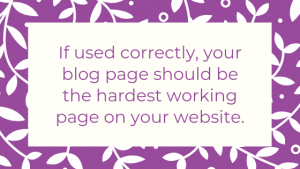Do you want a hard-working blog?
In the last few years, blogging has grown increasingly important for businesses looking to build relationships with their audiences.
No longer the hidden page on your website highlighting your latest corporate news, blogs can be used to share your knowledge and expertise. They can demonstrate your brand personality and help you differentiate yourself from your competitors.

It should not only drive traffic directly to your website by referring to your specific services, but it should contribute a significant proportion of output on your social media channels. It should also lead to an increase in referrals as readers are encouraged to contact you directly after reading your content.
Why you should start blogging
According to SEO Tribunal, companies who blog are likely to receive 97% more backlinks to their website than those who do not. This is backed up by Constant Content who suggests that featuring a blog on your site will give you a 434% better chance of being ranked highly on search engines. Blogs can also increase the impact of your email marketing campaigns as well as provide timely, and relevant content to share across your social media platforms.
Do any of the other pages on your website work as hard as this?
As experienced copywriters, we’ve worked with many Suffolk-based companies to help them develop cohesive content marketing strategies that help them to make the most of their blogging potential. We’ve seen how great blogs can increase audience engagement, helping you to establish strong brand recognition and improved sales.
Here are just a few of our suggestions for how you can ensure that you have a hard-working blog.
Establish a dedicated blogging strategy
The most important thing of all is to establish a cohesive plan of action that will inform what you want to do, how you want to do it, and identify why you are doing it and what you want to achieve.
It can be easy to simply jump in and start writing, but without a solid plan of what you want to do, it’s almost impossible to be successful.

The first thing you need to do is to create a cohesive plan of action. You should decide how often you are going to blog, what you want to write about, and decide who will write the content. You may find that if you’re busy, that it’s a good idea to delegate the writing amongst different members of your team. Each employee may have a different opinion or perception, but they can come together and showcase your expertise effectively, without taking over from your daily tasks.
Once you know what you want to write, you need to decide how you want to write it. In other words, what is your tone of voice? Blogs have great flexibility to them; they can be written in an extremely chatty, friendly style but they can also be authoritative and corporate. You need to take a company decision to decide how you want your readers to view your articles and communicate that tone of voice with your writers.
Is your blog doing what it sets out to do?
Over the years, we’ve read thousands of corporate blogs – some brilliant, some forgettable, and some unfortunately not particularly well written. When you write a corporate blog, you want your readers to understand its purpose – this comes back to the ‘why’ section of your blogging strategy.
What action do you want your reader to take after they’ve read your blog? The biggest mistake is allowing them to simply click away from your site without having done anything. You can use your article to direct readers to other pages (perhaps previous blog posts), or you could encourage them to pick up the phone and call you or email you. Or maybe you want them to subscribe to your mailing list.
If you have a clear call to action, you can use your analytics to determine if the blog has done what it set out to do.
Make your blog work hard – that’s what it’s there for
Once you’ve written your blog and published it onto your site, it can be easy to tick it off your ‘to-do’ list. But your blog isn’t going to find an audience if it’s sat static on your website. You need to direct your audience to your blog and let them know that it’s there.
If you send out regular email newsletters to your customer base, then make sure you include a link to your blog. You should also make sure that it’s shared on your social media – where possible, you should encourage your staff to ‘like’ and ‘share’ your corporate content as well. We always recommend repeatedly sharing on social media – particularly on platforms such as Twitter where your audience will only see it if they happen to be online when it’s posted. Try sharing different tweets at different times of the day; you may find that some days or times are better than others.

Don’t be afraid to repurpose your blog content so that you can reuse it in different ways. For instance, you may wish to take soundbites from your blog (perhaps a quote or a statistic) and use it on your social media channels. If you don’t have an in-house design team, there are free online tools available (such as Canva) which can help you create easy to use graphics or imagery to support your blog post. You could even use an automated tool such as Lumen5 to convert your blog into a video post.
You should also continue to share previous blog content. If the article is still relevant (and doesn’t have any dated references) then there is no reason why you cannot re-share content that you published several months prior. It will demonstrate more content for your social media channels and continue to drive audiences to your website long after its original publication date.
Why not outsource your blogging strategy?
We understand that most companies would prefer to keep their blogging strategy in-house, after all, who knows your business and your sector better than you? But as other priorities come to the forefront, your well-intentioned blogging plans can easily be left behind. Before you know it, you may have an unloved and untouched blog page which runs the risk of you looking dated or even worse, as if you’ve stopped trading.
If you are considering finding an external copywriter to manage your blogging strategy for you, it’s important to find the right match for your needs.
Your ideal copywriter should understand not only your business but your sector and your tone of voice.
They should be fully involved in your content strategy to help you maximise the efficiency of your blog and provide you with added value for money far beyond just the writing. For instance, you may wish to have a copywriter who can help identify new angles or topics for discussion. A great copywriter should also identify the correct keywords for your business, suggest appropriate subheadings and SEO tags or even suggest social media status updates for you in relation to the blog.
